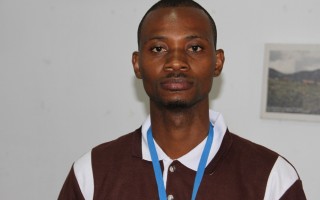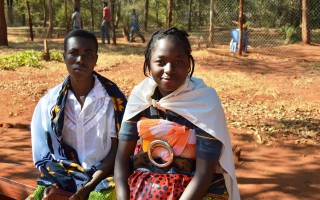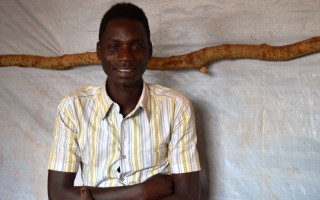I taught Psychology at a secondary school for three years.
Hakizimana fled to escape persecution in Burundi.
“I was a teacher back in Burundi before I came here. I taught Psychology at a secondary school for three years in Burundi. I am 33-years-old Burundian refugee. I traveled here alone to escape persecution.
I majored in Clinical Psychology and when I finished my education, I decided to teach at a local secondary school back home. I have always had a passion for teaching.
The situation in Burundi forced me to flee to Tanzania in fear of my safety. I had no other option. All because I was not a member of a certain party and had defied pressure to join them. I left behind my wife, two children and parents after receiving death threats.
I think about my family every day. I have not talked to them in a long time. An International call for 1 minute and 50 seconds from Tanzania to Burundi can cost around 2,000 Tanzania Shillings or US$ 1. I rarely have access to cash. Hence, it is very difficult for me to get in touch with my family back home.
I want to show my resilience. Therefore, I have chosen to stay productive while staying in the camp. In 2015, I volunteered to be an Education Coordinator through an initiative introduced by Caritas with support from UNHCR and UNICEF that provides an opportunity for refugee children to study in schools established within the premises of the camp. I was elected by the community for this Education Coordinator’s volunteer position. I have embraced this position wholeheartedly.
These children are the sons and the daughters of Burundi. I cannot leave them struggling. In my heart, I know these are our children and we have to help them get the education that they deserve so that one day they can bring about change in our country and prevent future generations from experiencing the ordeal we have suffered.
The refugee children in Nduta camp do not have access to proper classrooms. UNHCR together with partners have worked to provide temporary structures that have been utilized for safe areas to study. Some, however, are still studying under trees due to limited funds that can be used to set up new classrooms and accompanying facilities like latrines. There is a massive difference between teaching here in the camp and back in Burundi. Here, there are no materials like books which are extremely important for us to use.
For the most part, refugee children walk barefoot with no uniforms to the temporary structures set in the camp every day. We are very thankful for the initiative being introduced by Caritas with support from UNHCR and UNICEF. Thanks to this initiative, we have an avenue to provide access to education for Burundian children in Nduta refugee camp. I hope that we will be able to build more classrooms through this support.”
Published by Stephen Mhando, UNHCR
Will you stand #WithRefugees? Show your solidarity by signing the #WithRefugees Petition.
Let the world know that you are one who cares.
Share Hakizimana’s story with your friends and followers
Following advocacy efforts by the humanitarian community, the Burundian Government has recently agreed to let refugee children in all refugee camps in Kigoma region to sit for the national exams and be issued with certificates of completion.
Refugee volunteers like Honore are hopeful for peace to finally return to Burundi and that the children are able to continue with their higher education one day. “I want for our children here in the camp to have an opportunity like me to continue their education to the university. As for me, I hope to one day to be able to return home to my family and getting back to teaching in Burundi.”
Access to education creates a sense of normalcy and security for refugee children. Exposure to education throughout refugee camps has a positive impact for children that are going through a challenging living situation.
More stories
Bwiselelo fled the Democratic Republic of Congo
He is now a Sociology graduate from the University of Dodoma.
Jacklyn’s and Virginia’s stories
Two single mothers who fled Burundi.
Gerard’s story
He hopes that his linguistic skills can someday help him to fulfill his dreams.



